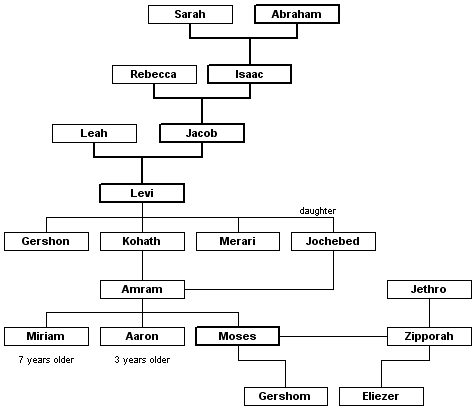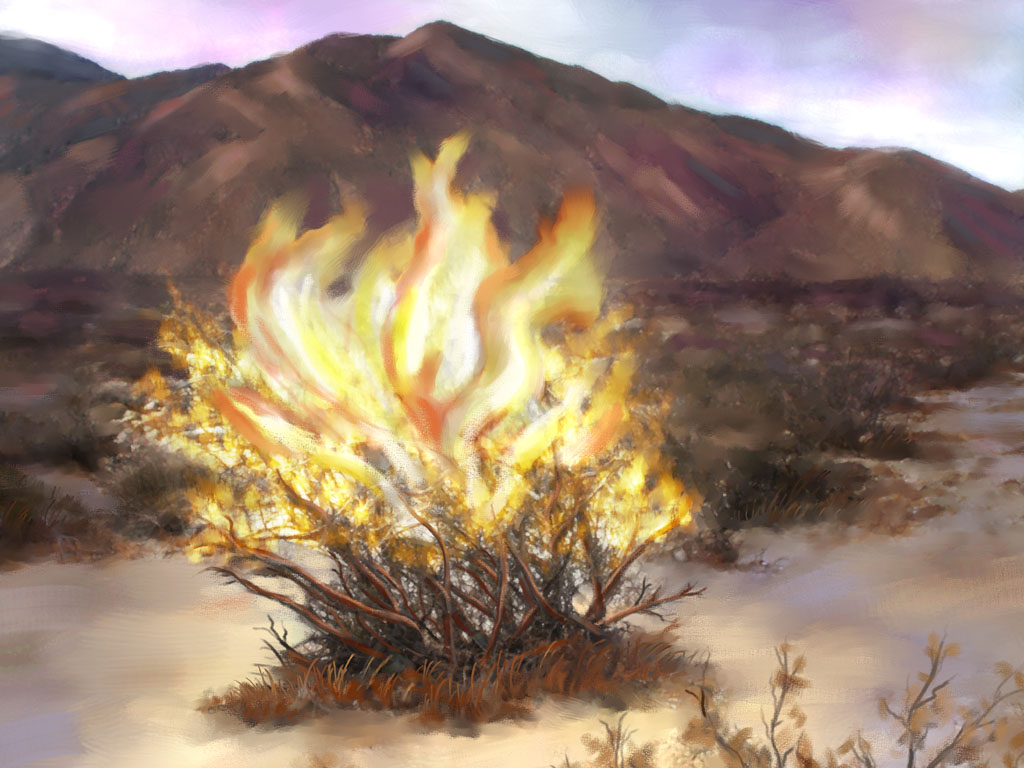|
שְׁמֹותParsha ShemothShemoth (Exodus) 1:1-6:1
These are the names of the children of Yisrael who came to Mitsrayim with Yaacob; | |||
The title of the second sefer (scroll) of Torah is שְׁמֹות Shemoth. שְׁמֹות Shemoth is the plural, Hebrew (Ibrit) word meaning names. The title comes from the phrase וְאֵלֶּה שְׁמֹות בְּנֵי יִשְׂרָאֵל w’eleh shemoth bne Yisrael, and these are the names of the children of Yisrael (Yashar’El). Therefore this Torah portion begins with the Shemoth or Names of the children of Yisrael who came to Mitsrayim to sojourn. This book has been called Exodus which means departure referring to the great migration from Mitsrayim (Egypt) to the Promised Land. Yahuwseph and his brothers lived long lives in the land of Mitsrayim. After they died, however a new Pharaoh arose to power. The Torah says that this Pharoah “did not know Yahuwseph”, therefore he afflicted the people of Yisrael (Israel) with oppressive slave labor. The Hebrews (Ibrim/Abrim) were commanded to build the cities of Pithom and Rameses. Though the hardships were great, the children of Yisrael prospered, continuing to multiplying at a rate that threatened the power of Pharaoh. Pharoah commanded that the midwives kill all male infants at birth. However, the midwives disobeyed Pharaoh and YaHuWaH baruch (“blessed”) them for it. This led Pharoah to decree that all infant males of the house of Yisrael (Israel) should be drowned in the Nile. | |||
Now the scene was set for the birth of a deliverer. Amram, grandson of Lewi married Yochebed, a daughter of Lewi, together they had a daughter by the name of Miriam and a son named Aharon. During the time of Pharoah’s decree to have all males drowned in the Nile, Yochebed gives birth to a baby boy who would be named Mushah (Moses/Mosheh). Yochebed hid the child for three moons (yerachim) as the Torah poetically reads. Eventually she realizes that keeping the baby a secret would be too challenging. She places her baby boy in an “ark”, which was a basket overlaid with pitch for waterproofing, among the reeds of the Nile river. Little Miriam followed the basket to see what will happen to her baby brother.Pharaoh’s daughter came to bathe and noticed the ark. The princess “draws” the baby out and therefore names him משֶׁה “Mosheh” which is a form of the word mashah מָשָׁה, meaning to draw out. The Dead Sea Scrolls sometimes use the full spelling מושה which never appears in the Massoretic Text. This shows us that the pronunciation of his name was indeed either Mosheh or Mushah with a preference towards the later. “Because,” she said, “I drew him out “mashah” (מָשָׁה) of the water” This word also gives us the word מָשִׁיחַ Mashyach which means anointed. The words Hushea, Yashuah and Mushea, all meaning deliverance come from the same root as Mashah. Truly מושה Mosheh/Mushah is a picture of the coming Mashyach! After Miriam saw that the Princess named Mushah and claimed him as her own, suggests finding a suitable nursemaid. She arranges for her brother Mushah to be nursed and cared for by his own true mother Yochebed. Family Tree of Mosheh (Moses/Mushah) | |||
As Mosheh began to grow and mature he went among his kinsmen and observed their suffering. Upon a certain day Mosheh saw a Mitsrayin (Egyptian) slave driver beating a Hebrew, therefore Mosheh killed the Mitsrayin and hid his body in the sand. The next day, Mushah tried to settle an argument between two Ibrim (Hebrews). One of them asks,מִי שָֽׂמְךָ לְאִישׁ שַׂר וְשֹׁפֵט עָלֵינוּ mi samekha l’ish sar w’shofet aleinu? This phrase should be accurately translated “Who made you a prince and judge over us?” Most translations do not accurately translate prince and use the translation ruler. This is a prophetic statement due to the fact that יהוה YaHuWaH openly chooses Mushah to be both a Prince and Judge later in the narrative. After this event the man asks Mosheh if he intended to kill them as he had killed the Mitsrayin (Egyptian) the day before. When Mosheh realizes that the matter was known he fled, knowing that Pharoah would seek his life. Mosheh left Mitsrayim to go to the land of Midian (Madian) today known as Arabia, amongst the distant cousins of the Yisraelites. Upon his arrival he happened to witness a struggle between the daughters of Yithro and some shepherds. Mosheh rose to the occasion and defended the young maidens and drew the water they needed. Yithro later rewarded Mosheh by giving him his daughter Zipporah as a wife. Mosheh and Zipporah would end up having two sons together, Gershom and Eliezar. Mushah dwelt in Midian as a shepherd for forty years. Sometime during his sojourn in the land of Midian the Pharaoh who wanted to kill him passed away. His replacement intensified the oppression of the children of Yisrael. They cried out to יהוה YaHuWaH and he heard their pain and their groaning, and remembered his covenant with Abraham, Yitshaq, and Yaacob.- Shemoth (Exodus) 2:25 וַיַּרְא אֱלֹהִים אֶת־בְּנֵי יִשְׂרָאֵל וַיֵּדַע אֱלֹהִֽים׃ –Elohim saw the people of Yisrael- and Elohim knew.It came to be that Mushah was tending Yithro’s flock near mount Horeb (i.e. Sinai) and the מַלְאַךְ יהוה Malakh YaHuWaH appeared to him in a flame of fire מִתֹּוךְ הַסְּנֶה mitokh ha-seneh – “out of the midst of a bush” Shemoth (Exodus) 3:1-2. The word מַלְאַךְ Malakh has been translated into the Greek Angleos and given to us the English word Angel. However Angels in Greek mythology are extremely idolatrous and this word does not properly convey the original meaning. מַלְאַךְ Malakh simply means messenger, and here we see the מַלְאַךְ יהוה Malakh YaHuWaH or literally The Messenger YaHuWaH appears before Mushah, just as he did to Abraham, Yitshaq and Yaacob before him. YaHuWaH instructs Mushah and appoints him shalyach meaning emissary or “apostle”, as some would say, but most literally ambassador, in order that he should deliver the house of Yisrael out of the hand of Pharoah. Mushah immediately asks one of the most profound questions in history, “If I come to the people of Yisrael and say to them, ‘The Elohim of your fathers has sent me to you,’ and they ask me, ‘What is his name?’ what shall I say to them? And Elohim said to Mushah, “I am that which I am.” And He said, “Thus you shall say to the children of Yashar’al, ‘I am has sent me to you.’ ”And Elohim said further to Mushah, “Thus you are to say to the children of Yisrael, ‘YaHuWaH Elohim of your fathers, the Aluahym of Abraham, the Elohim of Yitshaq, and the Elohim of Yaacob, has sent me to you. This is My Name forever, and this is My remembrance to all generations! Shemoth (Exodus) 3:13-15 The phrase translated “I am that I am” comes from the Hebrew אֶהְיֶה אֲשֶׁר אֶהְיֶה AhaYAH asher AhaYAH which today is most often rendered Ehyeh asher Ehyeh in the imperfect form. אֶהְיֶה AhaYah literally means “I exist” and comes from the verb hayah (הָיָה), meaning to “exist”. This announcement that Elohim is self existing and self-sustaining is literally an explanation of the four lettered proper Name YaHuWaH (יהוה). Ha Shem or The Name can thus be understood, “He who exists” or “The existing who exists”. YaHuWaH is stating that all things exist because he exists. YaHuWaH armed Mosheh with his Name and then said, “Go and gather the elders of Israel together and say to them, ‘YaHuWaH, the Elohim of your fathers, the Elohim of Abraham, of Yitshaq, and of Yaacob, has appeared to me, saying, “I have observed you and what has been done to you in Mitsrayim and I promise that I will bring you up out of the affliction of Mitsrayim to land flowing with milk and honey” (Exod. 3:16-17). YaHuWaH also gave Mushah signs to perform to the Elders of Yisrael. 1) His staff would turn into a snake 2) His hand would become leprosy and then recover 3) He would turn water into blood. Mushah claims he is kebad peh – “heavy of mouth” and kebad lashon, “heavy of tongue,” and therefore unable to speak on behalf of YaHuWaH (Exod. 4:10). YaHuWaH responded “Who makes him mute, or deaf, or seeing, or blind? Is it not I, YaHuWaH?” Exodus 4:11. YaHuWaH then appointed Aharon to be Mushah’s speaker and by doing this made him Kohen (priest). Mushah is reunited with his brother Aharon at Sinai. Together they journey to Mitsrayim where they assemble the elders of Yashar’al and show them the signs of YaHuWaH. Mushah and Aharon later appear before Pharaoh to deliver the message from YaHuWaH: Let my people go! Along the way back to Mitsrayim, YaHuWaH threatened to kill Mushah on account of a delay in the circumcision of his son. Mushah failed to immediately perform the ritual so YaHuWaH came to kill him. Tzipporah (Mushah’s wife) then performed the circumsion and responds to Mushah, Chatan damim lamulot – You are a bridegroom of blood to me, because of the circumcisions. A bridegroom of blood is an interesting correlation to the suffering of Mashyach. The message to Pharaoh was clear, “Let my people go, that they may hold a feast to me in the wilderness.” Pharaoh replied, מִי יְהוָה אֲשֶׁר אֶשְׁמַע בְּקֹלֹו לְשַׁלַּח אֶת־יִשְׂרָאֵל mi YaHuWaH asher eshma’ b’kolo l’shalach et-Yisrael? “Who is YaHuWaH, that I should obey his voice and let Yisrael (Israel) go?” Pharoah was esteemed as a Mighty One, as an immortal idol, and here in his ignorance he says “Who is YaHuWaH that I should obey his voice?” Pharaoh rejected their request and forced even harsher slave labor upon Yisrael. Due to the overload of work the Hebrew foremen blamed Mushah. The Torah portion ends with Mushah praying to YaHuWaH for help: “For since I came to Pharaoh to speak in your Name, he has done evil to this people, and you have not delivered your people at all.” YaHuWaH responded to Mosheh, “Now you shall see what I will do to Pharaoh; for he shall let the people go because of a greater might; indeed, because of a greater might he shall drive them from his land.” The Pharaohs of this age may not recognize YaHuWaH at present time but that is all about to change. What YaHuWaH did to Egypt (Mitsrayim) is only a picture of what shall happen in the last days.
| |||





